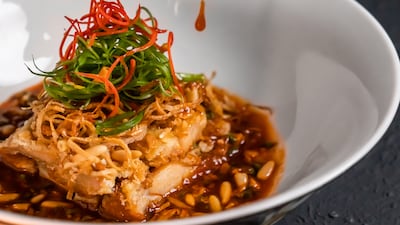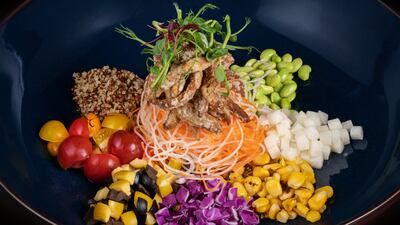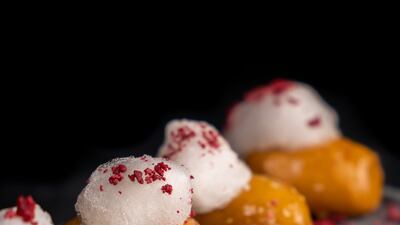He calls himself the demon chef, is the creator of his own cuisine (X-treme Chinese, anyone?) and his restaurant Bo Innovation in Hong Kong has been awarded two Michelin stars, while Bo London has one.
Now, Alvin Leung is opening a new restaurant in the UAE. He will welcome discerning (read: daring) diners to Demon Duck at Caesars Palace Bluewaters Dubai from March 21.
The UK-born Hong Kong-Canadian chef and television personality, who also runs Forbidden Duck restaurant in Hong Kong and Singapore, chats to The National about ingredients, experimentation and expansion.
What’s the story behind your “demon” moniker and “X-treme” Chinese cuisine?
I named myself the “demon chef” because when I first started out, some people called me “god chef”, which I think was blasphemous. Also I thought it would be more fun being a demon chef; I would be able to get away with the way I think, present, cook and innovate in a more twisted and unconventional way. So, because I didn’t want to be conventional, demon was the perfect name, and it comes from the Greek word “daimon”, meaning a playful spirit.

I used “X-treme” as I was trying to create a restaurant as a chef who had never been formally trained. So, I adapt by doing what I feel I am best equipped to do.
What are some of your most innovative dishes?
I like to take things to the limit because I want to open up the human mind, as well as see what I can get away with. So I’ve done a molecular xiao long bao, which is just a burst of xiao long bao-flavoured soup in the mouth as you try to bite it; there’s nothing to chew.
In Demon Duck, Dubai, I will use Turkish delight in my sweet and sour chicken, adding a hint of rose to complement the lychee.
My pineapple shawarma dessert is an example of a Middle Eastern twist on my Chinese cuisine. And my Demon hummus is a tribute to the staple regional dish. I really want [local diners] to try them and tell me if I did justice to these dishes.
What’s the Dubai restaurant’s interior and vibe like?
The decor is by a local interior design team accented with eccentric, quirky depictions of duck art by Hong Kong photographer Mark Chung and playful graffiti and Middle Eastern-inspired mosaic patterns on crockery designed by Monica Tsang.
There is an outdoor garden terrace and a stylishly modern indoor dining space. The restaurant looks like a sexy duck!
The duck does feature quite widely in your culinary repertoire…
Duck is a very versatile dish; it’s kind of like a beefy chicken. You can slow-roast duck, it can be braised, steamed … I have done duck tartare, crispy duck and aged Peking duck. So there are many ways to cook it and when you cook it differently, it has different characteristics. The ageing and slow-cooking process I have developed over the years has yielded some amazing results.
What’s your favourite ingredient or seasoning to work with, and why?
I see ingredients more as textures and taste, rather than individual entities, and seasoning as a combination of several flavours. So rather than one favourite, I have a combination of tastes, such as hot and sour, sweet and sour, or salty and bitter.
Among these, I do have an affinity for sour and salt, so my favourite seasoning is a combination of vinegar and salt, which is something you can taste on my bang bang chicken or the sauces in our Sichuan dishes.

Would you say Chinese food lends itself best to experimentation, given how many spin-offs it has?
I don’t think it’s just Chinese food. Immigrants going to a new country always tend to adapt, either to the local environment or the local ingredients. Being an immigrant myself, this is very applicable to me.
There’s a part of me that is British Indian, Chinese Indian [and] American Chinese. Adaptability is part of the survival-of-the-fittest theory, where we have to adapt to our environment, and this goes for all cuisines.
Finally, why Dubai, why now and what next?
Why Dubai? Why not! The Middle East is beginning to [welcome] the world, and Dubai and Abu Dhabi are cities that are open to international tourism. So, this is a great opportunity and good exposure. Also, Chinese food is becoming more popular and common, and a lot of Chinese, too, are now touring the world and visiting the UAE.
As to why right now, because now is when the opportunity with Caesars Palace Dubai arose. This is not the first time I was asked to do a restaurant in Dubai, but I wanted to work with someone I know, and Tony [Anthony Costa, regional president at Caesars Palace Bluewaters Dubai] I know from Hong Kong, and I like him and I trust him.
Now that I have a base here, it definitely sets up more and more possibilities. Having a presence in Dubai means I plan to visit often and can make more side trips around the region or across other parts of the UAE. So further expansion in the Emirates would be something I would consider, but [with] a trusted partner.






